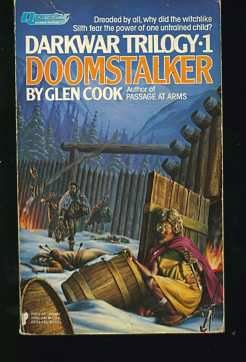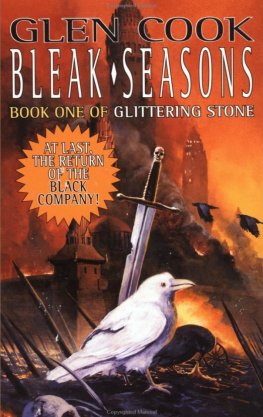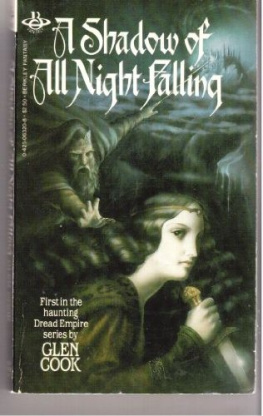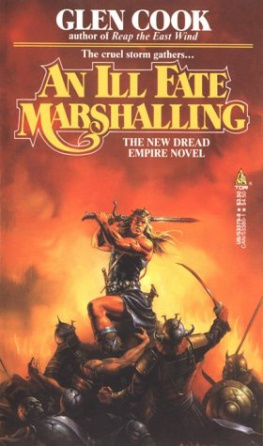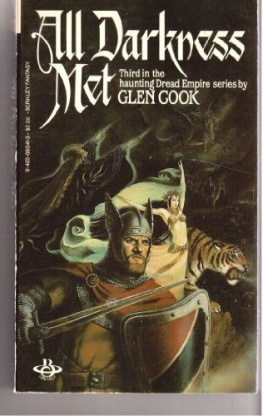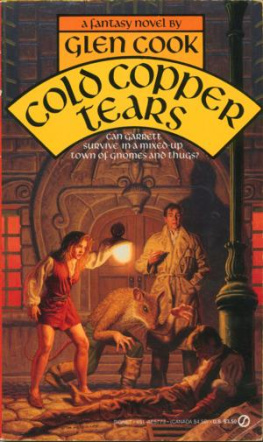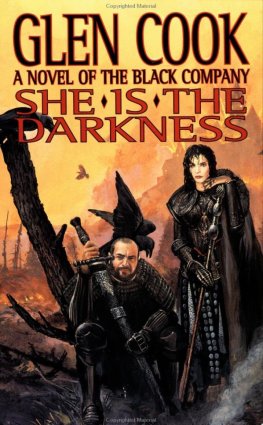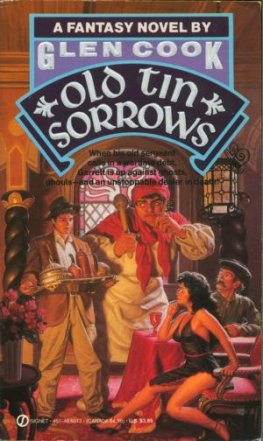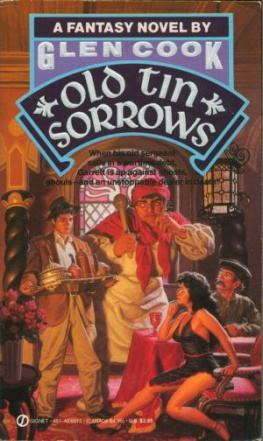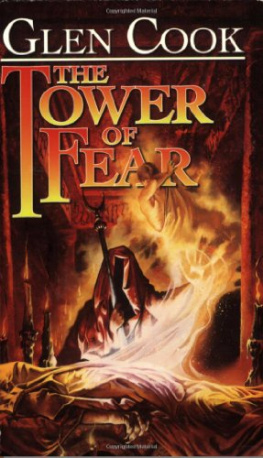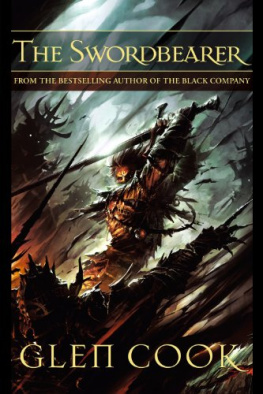Glen Cook
Doomstalker
Chapter One
I
It was the worst winter in memory. Even the Wise conceded that early on. The snows came out of the Zhotak early, and by Manestar Morning they stood several paws deep. They came on bitter winds that found every crack and chink in the Degnan loghouses till in frustration the older females ordered the males out to cover the curved roofs with blocks of sod. The males strove valiantly, but the ice-teethed wind had devoured the warmth of the ground. The earth would not yield to their tools. They tried packing the roofs with snow, but the ceaseless wind carried that away. The ranks of firewood dwindled at an alarming rate.
It was customary for the young of the pack to roam the nearby hills in seach of deadwood when they had no other chores, but this bitter winter the Wise whispered into the ears of the huntresses, and the huntresses ordered the pups to remain within sight of the packstead palisade. The pups sensed the change and were uneasy.
Nobody said the word "grauken." The old, terrible stories were put aside. Nobody wanted to frighten the little ones. But the adults all knew weather like this conjured the beast lying so near the surface of the meth.
Game would be scarce on the Zhotak. The nomad packs of the northland would exhaust their stored food early. They would come south before long. Some did even during the milder winters, stealing where they could, fighting if they had to to seize the fruits of the labors of their sedentary cousins.
And in the terrible winters-as this promised to become-they even carried off young pups. Among meth, in the heart of the great winter, hunger knew no restraint.
In the fireside tales the grauken was a slavering beast of shadowed forests and rocky hills that lay in wait for careless pups. In life, the grauken was the hunger that betrayed civilization and reason. The Degnan Wise whispered to the huntresses. They wanted the young to develop the habit of staying close and alert long before the grauken came snarling up from its dark place of hiding.
Thus, another burden fell upon the harried males. They ventured out in armed parties, seeking firewood and long, straight logs suitable for construction. To their customary exhausting duties were added the extension and strengthening of the spiral stockade of needle-pointed logs and the bringing of snow into the loghouses to melt. The water produced, they returned to the cold, where they poured it into forms and froze it into blocks. With these ice cakes they sheathed the exteriors of the loghouses, bit by bit.
This winter's wind was like none the pack had ever known. Even the Chronicle did not recall its like. Never did it cease its bicker and howl. It became so cold the snow no longer fell. Who dared take a metal tool into a bare paw risked losing skin. Incautious pups suffered frostbitten muzzles. Fear glimmered in the eyes of the Wise as they bent their toothless heads together by the fires and muttered of signs and evil portents. The sagan, the wisest of the Wise, burned incense and made sacrifice daily. All the time she was awake her shaky, pain-deformed old paws wove powerful fetishes and banes to mount over the entrances to the loghouses. She commanded ceremonies of propitiation.
And the wind continued to blow. And the winter grew more cold. And the shadow of fear trickled into the bravest of hearts.
Huntresses found unfamiliar meth tracks just a few hours away from the packstead, up near the boundary with the Laspe hunting grounds. They might have been made by Laspe huntresses ranging out of their territory, seeking what small game did not hibernate. But the snow held no scent. Fears of the worst became haunting. Could it be that savages from the north were scouting the upper Ponath already?
Remnants of an old fire were found at Machen Cave, not far north of the packstead. Even in winter only the brave, the desperate, or the foolish nighted over in Machen Cave. The Laspe, or any other of the neighbors, would have traveled on by night rather than have sheltered there. So the Wise whispered and the huntresses murmured to one another. Those who knew the upper Ponath knew that darkness dwelt within Machen Cave.
II
Marika, Skiljan's pup, reached her tenth birthday during the worst of winters, when the fear lurked in the corners of her dam's loghouse like shadows out of the old stories the old females no longer told. She and the surviving pups of her litter, Kublin and Zamberlin, tried to celebrate the event in traditional pup fashion, but there was no breaking the gloom of their elders.
Skits drawn from folklore were customary. But Marika and Kublin had created their own tale of adventure, and over the protests of conservative Zamberlin, had rehearsed it for weeks. Marika and Kublin believed they would astonish their elders, Zamberlin that they would offend the hidebound Wise. In the event, only their dam proved insufficiently distracted to follow their story. All their expectations were disappointed. They tried flute and drums. Marika had a talent for the flute, and Zamberlin enthusiasm on the skins. Kublin tried to sing.
One of the old females snarled at the racket. They failed to stop sufficiently soon. Skiljan had to interpose herself between the old female and the pups.
The pups tried juggling, for which Marika had an exceptional talent. In summertime the old females always watched and cooed in amazement. She seemed able to command the balls in the air. But now even their dam showed no interest.
Desolate, the pups slinked into a corner and huddled for warmth. The chill was as much of the heart as of the flesh.
In any other season their elders would have snapped at them, telling them they were too old for such foolishness. In this dread season the old ignored the young, and the young stayed out of the path of the old, for tempers were short and civilization's edge lay very near the surface. A meth who slipped over could kill. They were a race with only the most tenuous grasp on civilized behavior.
Marika huddled with her littermates, feeling the rapid patter of their hearts. She stared through the smoky gloom at her elders. Kublin whimpered softly. He was very frightened. He was not strong. He was old enough to know that in the hard winters weakling males sometimes had to go.
In name the loghouse was Skiljan's Loghouse-for Marika's dam-though she shared it with a dozen sisters, their males, several older females, and all their pups. Skiljan commanded by right of skill and strength, as her dam had before her. She was the best huntress of the pack. She ranked second in physical endurance and strength, and first in will. She was among the smartest Degnan females. These being the qualities by which wilderness meth survived, she was honored by all who shared her loghouse. Even the old females deferred when she commanded, though it was seldom she ignored their advice. The Wise had more experience and could see behind veils youth drew across the eyes. In the councils of the packstead she spoke second only to Gerrien.
There were six similar loghouses in the Degnan packstead. None new had been erected within living memory. Each was a half cylinder lying on its side, ninety feet long and a dozen high, twenty-five wide. The south end, where the entrance was, was flat, facing away from winter's winds. The north end was a tapering cone covering a root cellar, providing storage, breaking the teeth of the wind. A loft hung six feet above the ground floor, half a foot above the average height of an adult meth female. The young slept up there in the warmth, and much that had to be stored was tucked away in the loft's dark crannies and recesses. The loft was a time vault, more interesting than the Chronicle in what it told of the Degnan past. Marika and Kublin passed many a loving hour probing the shadows, disturbing vermin, sometimes bringing to light treasures lost or forgotten for generations.
Next page
